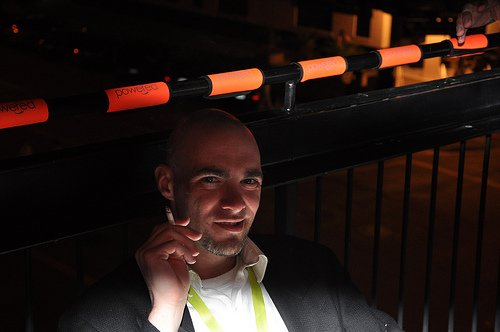When I tell people that I am actually an introvert, it usually surprises people. As someone who is in the public eye, and maintains some kind of brand that is recognizable, most people see me as an outgoing guy who is always trying to be a part of the latest social scene and while that is true, it’s important to note that it is only a portion of who I really am.
This goes for anyone on the internet. With the social web, it is easy for people to feel like they actually know us. They see us as marketers, branders, celebrities. They see us as subject matter experts and they want our time. Clearly, this was on display at SXSW this past weekend where a simple jaunt to lunch that normally take about 5 mins, would take 20-30 mins because of casual conversation assaults in the hallways.
 PHoto by: Jim Storer
PHoto by: Jim Storer
Is this a problem? Directly, no. We go to these events to meet people and people are our lifeblood. Without people, we are no one and we have no credibility. Our credibility is wrapped up in our communities, readers, viewers, listeners and those who are influenced by our work. However, the cult of personality as a whole, is a larger problem.
When Mike Arrington was in Europe earlier this year, someone who felt like they knew him (in a negative way) assaulted him with spit to the face. When Kathy Sierra had vicious threats directed at her, she disappeared out of the public eye for some time. Jeremiah Owyang also recently disappeared for different reasons.
We are not wired to be the center of attention. In some sick and twisted way, we love every second of it. Our egos are stroked when adoring fans adore, but we are doused with harsh reality when that attention turns a different direction.
In the past few days, I’ve given a lot of thought to “going dark” – that is, disappearing from public view for a period of time. I still may do that, simply because, my own “celebrity” is beginning to hinder me. As those of us who enjoy immense attention grow into those roles, inevitably we begin to resent it. We hate it. We want to be “normal” whatever “normal” means. We want our lives back.
But at what cost?
In some ways, going dark can be therapeutic. It allows us time to re-examine our priorities, understand our motives and, in general, do soul searching. If done right, we come out the other side with a fresh perspective on life and our livelihoods.
In a negative sense, going dark can have tremendous effect on our social equity. In a “what have you done for me lately” industry, disappearing for some time can completely remove a person and their ability to influence. In some cases, our businesses and careers depend on our presence in the social space.
I don’t have the answers, as I have not “gone dark” at any point. If I do, I’m sure I’ll find my experience will teach me something about the process. It strikes me that a successful sabbatical requires some kind of balance so as not to lose social equity, yet still take enough time to recharge and re-energize.
